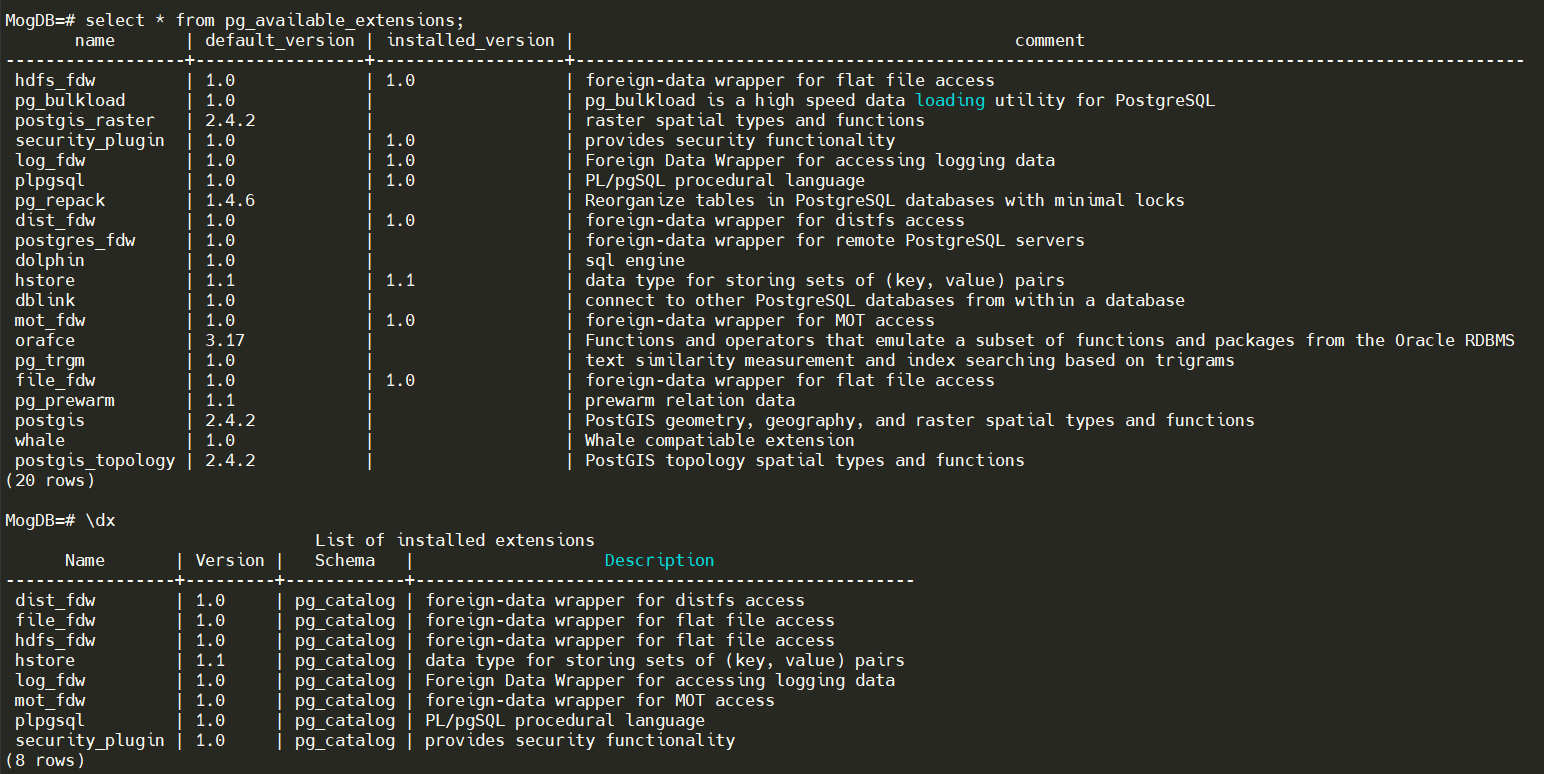-
openGauss/MogDB脚本源码浅析(2)—— gs_install_plugin/gs_install_plugin_local
摘要
MogDB提供了gs_install_plugin/gs_install_plugin_local工具用于安装插件,目前支持安装的插件包括pg_repack、pg_trgm、dblink、wal2json、orafce、pg_bulkload、pg_prewarm等。gs_install_plugin适用于一主多备部署的MogDB,gs_install_plugin_local适用于单机部署的MogDB。
这两个工具是python编写的脚本,直接可以看到源码实现。本文通过对两个工具的源码进行分析,希望从底层了解插件安装的原理,掌握原理后可以在安装出现问题或者手动安装时对整个安装流程有所帮助。
整体流程
主要流程有如下几个步骤:
1 解析参数
根据命令行传入参数进行解析,并设置相关变量,如:要安装哪些插件、是否强制覆盖、指定安装包路径、是否开启调试信息等。

- -h, --help
显示帮助信息
- -p
指定plugins安装包位置,默认在$GPHOME/script/static寻找plugins安装包
- –all
安装全部插件
- –force
指定覆盖旧的插件
- –plugins
可安装多个插件,–plugins后跟插件名
- –PLUGIN_NAME
指定安装某一个插件,如:–dblink
- –debug
输出debug信息
详细请参考“官方文档”
2 初始化Deploy类
将解析好的参数赋值给Deploy类的成员变量。

几处关键代码:
- 环境变量和关键目录
GAUSSHOME = os.getenv("GAUSSHOME") GPHOME = os.getenv('GPHOME') LIB_POSTGRESQL_DIR = f'{GAUSSHOME}/lib/postgresql' EXTENSION_DIR = f'{GAUSSHOME}/share/postgresql/extension' CONTRIB_DIR = f'{GAUSSHOME}/share/postgresql/contrib'- 1
- 2
- 3
- 4
- 5
主要是得到下载插件包的目录和安装openGauss插件的系统目录。
- 插件包目录
如果没有设置-p选型,则使用默认目录
self.plugin_pkg = f"{GPHOME}/script/static/Plugins-*.tar.gz"- 1
- 解压插件包的目录
self._plugins_temp_dir = f"{GPHOME}/script/static/plugins/" self.executor(f'mkdir -p {self._plugins_temp_dir}') logger.debug(f"deconpress plugin package to {self._plugins_temp_dir}") self.local_execute(f"tar -xf {self.plugin_pkg} -C {self._plugins_temp_dir}")- 1
- 2
- 3
- 4
- 集群相关
-X Specify the XML file path- 1
如果是集群安装(使用gs_install_plugin工具),需要指定cluster_config.xml的位置,通过下面方法获得具体node的ip地址并检查链接:
self.nodenames = self.read_cluster_hosts(self.xml) self.ssh_tool = SshTool(self.nodenames)- 1
- 2
- 读取desc.json文件
解压MogDB插件包后,文件夹下面有desc.json文件,文件中包含了版本信息,插件名称和安装的目标路径。插件名称对应同级目录下插件目录的名称,files节点对应了插件目录中的文件。

{ "version": "3.0.1", "plugins": [ { "name": "pg_trgm", "files": { "pg_trgm.so": "lib/postgresql", "pg_trgm.control": "share/postgresql/extension", "pg_trgm--1.0.sql": "share/postgresql/extension", "pg_trgm--unpackaged--1.0.sql": "share/postgresql/extension" } }, { "name": "dblink", "files": { "dblink.so": "lib/postgresql", "dblink.control": "share/postgresql/extension", "dblink--1.0.sql": "share/postgresql/extension", "dblink--unpackaged--1.0.sql": "share/postgresql/extension" } }, { "name": "orafce", "files": { "orafce.so": "lib/postgresql", "orafce.control": "share/postgresql/extension", "orafce--3.17.sql": "share/postgresql/extension" } }, { "name": "wal2json", "files": { "wal2json.so": "lib/postgresql" } }, { "name": "pg_repack", "files": { "pg_repack": "bin", "pg_repack.so": "lib/postgresql", "pg_repack.control": "share/postgresql/extension", "pg_repack--1.4.6.sql": "share/postgresql/extension" } }, { "name": "pg_bulkload", "files": { "pg_bulkload": "bin", "pg_bulkload.so": "lib/postgresql", "pg_bulkload.control": "share/postgresql/extension", "pg_bulkload--1.0.sql": "share/postgresql/extension", "pg_bulkload.sql": "share/postgresql/extension", "pg_bulkload--unpackaged--1.0.sql": "share/postgresql/extension", "uninstall_pg_bulkload.sql": "share/postgresql/extension", "pg_timestamp.so": "lib/postgresql", "pg_timestamp.sql": "share/postgresql/contrib", "postgresql": "bin", "uninstall_pg_timestamp.sql": "share/postgresql/contrib" } }, { "name": "pg_prewarm", "files": { "pg_prewarm.so": "lib/postgresql", "pg_prewarm.control": "share/postgresql/extension", "pg_prewarm--1.1.sql": "share/postgresql/extension" } }, { "name": "dolphin", "files": { "dolphin.so": "lib/postgresql", "dolphin.control": "share/postgresql/extension", "dolphin--1.0.sql": "share/postgresql/extension" } }, { "name": "whale", "files": { "whale.so": "lib/postgresql", "whale.control": "share/postgresql/extension", "whale--1.0.sql": "share/postgresql/extension" } }, { "name": "postgis", "files": { "libjson-c.so.2": "lib", "libgeos_c.so.1": "lib", "libproj.so.9": "lib", "libgeos-3.6.2.so": "lib", "libgdal.so.1": "lib", "liblwgeom-2.4.so.0": "lib", "postgis-2.4.so": "lib/postgresql", "rtpostgis-2.4.so": "lib/postgresql", "postgis_topology-2.4.so": "lib/postgresql", "postgis.control": "share/postgresql/extension", "postgis--2.4.2.sql": "share/postgresql/extension", "postgis_raster--2.4.2.sql": "share/postgresql/extension", "postgis_raster.control": "share/postgresql/extension", "postgis_topology--2.4.2.sql": "share/postgresql/extension", "postgis_topology.control": "share/postgresql/extension" } } ] }- 1
- 2
- 3
- 4
- 5
- 6
- 7
- 8
- 9
- 10
- 11
- 12
- 13
- 14
- 15
- 16
- 17
- 18
- 19
- 20
- 21
- 22
- 23
- 24
- 25
- 26
- 27
- 28
- 29
- 30
- 31
- 32
- 33
- 34
- 35
- 36
- 37
- 38
- 39
- 40
- 41
- 42
- 43
- 44
- 45
- 46
- 47
- 48
- 49
- 50
- 51
- 52
- 53
- 54
- 55
- 56
- 57
- 58
- 59
- 60
- 61
- 62
- 63
- 64
- 65
- 66
- 67
- 68
- 69
- 70
- 71
- 72
- 73
- 74
- 75
- 76
- 77
- 78
- 79
- 80
- 81
- 82
- 83
- 84
- 85
- 86
- 87
- 88
- 89
- 90
- 91
- 92
- 93
- 94
- 95
- 96
- 97
- 98
- 99
- 100
- 101
- 102
- 103
- 104
- 105
- 106
3 执行部署

- 解析desc.json文件,将解析结果存到datas[]中
datas = [] # json file to obtain plugin information, add to datas with open(desc_path, 'r', encoding='utf-8') as f: result = json.load(f) if "all" in para: datas = result.get("plugins") else: for plugin in result.get("plugins", {}): if plugin.get("name") in para: datas.append(plugin) if not datas: raise Exception("Invalid plugins: %s" % para)- 1
- 2
- 3
- 4
- 5
- 6
- 7
- 8
- 9
- 10
- 11
- 12
- 遍历datas[]中插件信息,进行文件copy,完成安装
# plugin file copy for data in datas: name = data.get("name") if not name: continue for file, path in data.get("files").items(): source_path = '/'.join([self.plugins_dir, name, file]) target_dir = '/'.join([GAUSSHOME, path]) self.copy_file(source_path, target_dir) print("SUCCESS: %s" % name)- 1
- 2
- 3
- 4
- 5
- 6
- 7
- 8
- 9
- 10
- 文件copy过程
def copy_file(self, source, target_dir): file_name = os.path.basename(source) if self.local_mode: if os.path.exists(f"{target_dir}/{file_name}") and not self.force: print("Warning: file %s already exists, skip copy" % (file_name)) return return shutil.copy2(source, target_dir) for host in self.nodenames: if not self.force: _, output = self.ssh_tool.getSshStatusOutput(f"test -f {target_dir}/{file_name} && echo 1 || echo 0", hostList=[host]) output = output.split(':')[-1] if int(output) == 1: print("Warning: [%s]: file %s already exists, skip copy" % (host, file_name)) continue self.ssh_tool.scpFiles(source, target_dir, hostList=[host])- 1
- 2
- 3
- 4
- 5
- 6
- 7
- 8
- 9
- 10
- 11
- 12
- 13
- 14
- 15
- 16
如果是本地安装则直接copy:
shutil.copy2(source, target_dir)如果是集群按照则使用scp进行copy:
self.ssh_tool.scpFiles(source, target_dir, hostList=[host])使用gs_install_plugin_local一直openGauss插件
准备环境
- 下载,安装插件包
[omm@host-10-208-76-194 script]$ cd /opt/mogdb/tool/script/ [omm@host-10-208-76-194 script]$ mkdir static [omm@host-10-208-76-194 script]$ cd static [omm@host-10-208-76-194 static]$ wget https://cdn-mogdb.enmotech.com/mogdb-media/3.0.1/Plugins-3.0.1-openEuler-arm64.tar.gz [omm@host-10-208-76-194 script]$ ./gs_install_plugin_local SUCCESS: pg_trgm SUCCESS: dblink SUCCESS: orafce SUCCESS: wal2json SUCCESS: pg_repack SUCCESS: pg_bulkload SUCCESS: pg_prewarm SUCCESS: dolphin SUCCESS: whale SUCCESS: postgis- 1
- 2
- 3
- 4
- 5
- 6
- 7
- 8
- 9
- 10
- 11
- 12
- 13
- 14
- 15
- 16
- 安装插件(默认全部安装)

- 创建插件
MogDB=# create extension orafce; CREATE EXTENSION MogDB=#- 1
- 2
- 3
- 4
- 下载编译openGauss插件
参见“MogDB秘籍 之 乾坤大挪移”中的关于编译安装openGauss插件章节。
迁移插件
以lo插件为例,进行迁移
- 创建lo目录
[omm@host-10-208-76-194 plugins]$ cd /opt/mogdb/tool/script/static/plugins/plugins [omm@host-10-208-76-194 plugins]$ ls dblink desc.json dolphin orafce pg_bulkload pg_prewarm pg_repack pg_trgm postgis wal2json whale [omm@host-10-208-76-194 plugins]$ mkdir lo [omm@host-10-208-76-194 plugins]$ ls dblink desc.json dolphin lo orafce pg_bulkload pg_prewarm pg_repack pg_trgm postgis wal2json whale [omm@host-10-208-76-194 plugins]$- 1
- 2
- 3
- 4
- 5
- 6
- 7
- 将openGauss插件复制到MogDB插件目录,并修改属组
[root@host-10-208-76-194 lo]# cp lo.so lo.control lo--1.0.sql /opt/mogdb/tool/script/static/plugins/plugins/lo [root@host-10-208-76-194 lo]# chown -R omm:omm /opt/mogdb/tool/script/static/plugins/plugins/lo- 1
- 2
- 修改desc.json

- 重新打包
tar -zcvf Plugins-3.0.1-openEuler-arm64.tar.gz plugins/- 1
注:这里重新打包有点麻烦,也可以修改代码,注释掉解压的步骤,或者优雅一点,则可以增加参数控制是否重新解压,如果不重新打包则解压是desc.json会被覆盖成老版本的,导致安装新插件失败。
总结
总的来说这两个工具还是比较好用的,代码实现也比较简单。了解原理之后可以根据几个关键路径手动安装,或者在遇到安装问题的时候可以通过本文的分析继续排查解决。
-
相关阅读:
MFC入门基础(十二)控件 CScrollBar的使用
MHA高可用配置及故障切换
SQLAlchemy 库创建数据库引擎和会话工厂附带SQLSERVER驱动版本确认方式
操作系统原理
10.12广州见 | 第十六届智慧城市大会报名通道全面开启
算法竞赛入门【码蹄集进阶塔335题】(MT2301-2305)
木棍加工时间优化,代码精简
Unity面试题随笔(一)
服务器安装mysql后无法远程连接
HJ107 求解立方根
- 原文地址:https://blog.csdn.net/xk_xx/article/details/126848402